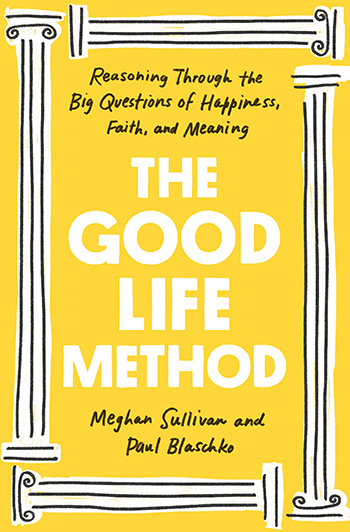Seeing ourselves through the darkness

Explore "aristotle" with insightful episodes like "Seeing ourselves through the darkness", "Seeing ourselves through darkness", "Happiness Lessons of The Ancients: Aristotle and Plato ICYMI", "Philosophical Tools for Living the Good Life" and "#419 - Meghan Sullivan & Paul Blaschko - A Philosopher's Guide To The Good Life" from podcasts like ""The Gray Area with Sean Illing", "The Gray Area with Sean Illing", "The Happiness Lab with Dr. Laurie Santos", "The Art of Manliness" and "Modern Wisdom"" and more!



The Greek thinker Socrates was put to death for encouraging his students to question everything - from their own beliefs to the laws and customs of Athenian society. But his ideas didn't die with him.
Here's a chance to hear two episodes from our archive examining the legacy of Socrates, and how he influenced the thinking of Plato and Aristotle. Turns out the Ancient Greeks had a lot to say about how to live a happier life.
See omnystudio.com/listener for privacy information.

Most everyone wants to live a good, meaningful life, though we don't always know what that means and how to do it. Plenty of modern self-improvement programs claim to point people in the right direction, but many of the best answers were already offered more than two thousand years ago.
My guests have gleaned the cream of this orienting, ancient-yet-evergreen advice from history's philosophers and shared it in their new book, The Good Life Method: Reasoning Through the Big Questions of Happiness, Faith, and Meaning. Their names are Meghan Sullivan and Paul Blaschko, and they're professors of philosophy at the University of Notre Dame. Today on the show Meghan and Paul introduce us to the world of virtue ethics — an approach to philosophy that examines the nature of the good life, the values and habits that lead to excellence, and how to find and fulfill your purpose as a human being. We discuss how to seek truth with other people by asking them three levels of what they call "strong questions" and engaging in civil and fruitful dialogue. We then delve into why your intentions matter and why you should use "morally thick" language. We also examine the role that work and love has to play in pursuing the good life, and how the latter is very much about attention. We end our conversation with how a life of eudaimonia — full human flourishing — requires balancing action with contemplation.



Despite our cultural differences, we have a very similar view of happiness across the world. So, what can we learn from the world’s happiest countries?
Feel Better Live More Bitesize is my new weekly podcast for your mind, body and heart. Each week I’ll be featuring inspirational stories and practical tips from some of my former guests.
Today’s clip is from episode 32 of the podcast with founder and CEO of the Happiness Research Institute - Meik Wiking.
Meik has travelled the globe interviewing some of the world’s happiest people to discover the key components of happiness, and in this clip, he explains some of his fascinating findings.
Show notes and the full podcast are available at drchatterjee.com/32
Follow me on instagram.com/drchatterjee
Follow me on facebook.com/DrChatterjee
Follow me on twitter.com/drchatterjeeuk
DISCLAIMER: The content in the podcast and on this webpage is not intended to constitute or be a substitute for professional medical advice, diagnosis, or treatment. Always seek the advice of your doctor or other qualified health care provider with any questions you may have regarding a medical condition. Never disregard professional medical advice or delay in seeking it because of something you have heard on the podcast or on my website.
Hosted on Acast. See acast.com/privacy for more information.


He gave us biology, physics and drama... but Greek philosopher Aristotle also thought deeply about how humans can flourish and live happy lives of virtue.
Yale professor Tamar Gendler tells Dr Laurie Santos about Aristotle's wellbeing insights and how he recommended taking daily "baby steps" towards becoming the sort of happy, moderate person we aspire to be. A kind of ancient "fake it, 'til you make it" ethos.
Learn more about your ad-choices at https://www.iheartpodcastnetwork.com
See omnystudio.com/listener for privacy information.

What does it mean to live a good life? How can we achieve that good life?
These are questions a Greek philosopher explored over 2,000 years ago in his Nicomachean Ethics. My guest today argues that the insights Aristotle uncovered millennia ago are still pertinent to us in the 21st century. Her name is Edith Hall, and she’s a classicist and the author of Aristotle’s Way: How Ancient Wisdom Can Change Your Life. Today on the show we discuss what Aristotle thought the good life was and how it’s different from our modern conception of happiness. We then dig into how Aristotle believed the cultivation of virtue was a key part of living a flourishing life and why understanding your unique potential and purpose is also important. Edith then shares insights from Aristotle on how to handle misfortune and become a better decision maker, as well as the importance of relationships to human happiness.
Get the show notes at aom.is/aristotle.

Today I’m really excited to have James and Suzann Pileggi Pawelski on the podcast. James is Professor of Practice and Director of Education in the Positive Psychology Center at the University of Pennsylvania where he cofounded the Master of Applied Positive Psychology Program with Martin Seligman. Suzie is a freelance writer, Psychology Today blogger, and well-being consultant specializing in the science of happiness and its effects on relationships and health. Together, James and Suzie are co-authors of the newly-released book “Happy Together: Using the Science of Positive Psychology to Build Love That Lasts”. They also give Romance and ResearchTM workshops together around the world.
In this episode we discuss:
Support this podcast: https://anchor.fm/the-psychology-podcast/support
See omnystudio.com/listener for privacy information.



Stay up to date
For any inquiries, please email us at hello@podcastworld.io